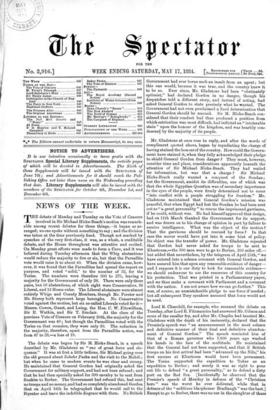Mr. Gladstone at once rose to reply, and after the
words of compliment quoted above, began by repudiating the charge of having stained the honourof the country. How could the Govern- ment have stained it, when they frilly acknowledged their pledge to shield General Gordon from danger P They must, however, consider time and place, considerations apparently beneath the attention of Sir Michael Hicks-Beach. They had waited for information, but was that a charge ? Sir Michael Hicks-Beach really wanted a conquest of the Soudan; but the Government, amidst its difficulties, one of which was that the whole Egyptian Question was of secondary importance in the eyes of the people, were firmly determined not to come "into conflict with a people struggling for freedom." Mr. Gladstone maintained that General Gordon's mission was peaceful, that when Egypt had lost the Soudan he had been sent out as "a great personality" to rescue the imprisoned garrisons, if he could, without war. He had himself approved that design, had on 11th March thanked the Government for its support, and VMS drawn on to his change of opinion in part by failure to receive intelligence. What was the object of the motion ? That the garrisons should be rescued by force P In that case the mover would have put into it some hint of policy. Its object was the transfer of power. Mr. Gladstone repeated that Gordon had never asked for troops to be sent to Khartoum,—the 300 men were to go to Berber, 260 miles off,— but added that nevertheless, by the telegram of April 25th, "we have entered into a solemn covenant with General Gordon, and have assured him that upon any reasonable evidence of danger— and I suppose it is our duty to look for reasonable evidence— we should endeavour to use the resources of this country for his protection. That was printed in a Parliamentary paper, and we thus make a covenant with Parliament and a covenant with the nation. I am not aware how we can go further." This was, of course, an unmistakeable pledge to use force if needed ; but all subsequent Tory speakers assumed that force would not be used.


































